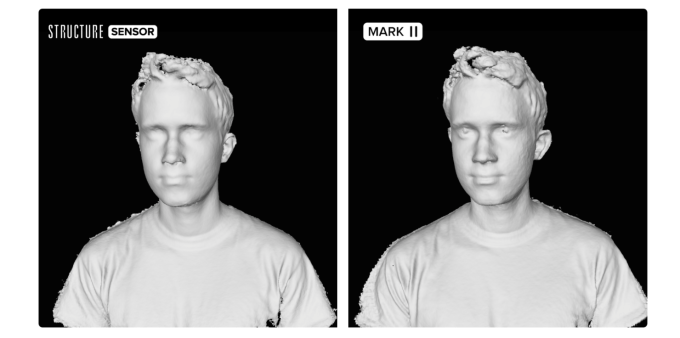Back in 2013, Occipital (a company then best known for making the RedLaser barcode scanning app) released the Structure Sensor, a device that turned any iPad you strapped it to into a portable 3D scanner.
Six years later, they’re back with the next one: Structure Sensor Mark II. It’s about half the size, but considerably more capable.
After releasing the original Structure Sensor, Occipital found that it was particularly popular in two different use cases: making 3D scans of people (like, say, scanning someone’s foot to make orthotics), and making 3D scans of rooms. Mark II’s specs and design have been tuned with these use cases in mind.
To improve accuracy when scanning a person, they’ve bumped up the resolution (from 640×480 on the original sensor to 1280×960 on Mark II) and increased the distance between the Structure’s cameras — thereby allowing it to capture finer details up close.

To help with room scanning, they’ve introduced a fish-eye lens; this widens the Structure’s view, which should help it perform better in smaller rooms.
Scanning range has been increased from 4m to 10m, they’ve added built-in gyroscopes/accelerometers, moved from a rolling shutter to a global shutter and a pair of new IR depth cameras let it scan outdoors (whereas v1 was stuck inside).
If you’ve been watching this space closely, you might remember that Occipital released a device called the Structure Core late last year. Whereas the original Structure is primarily meant to be strapped to an iPad (and is built with iOS compatibility in mind), the Structure Core was built to work with everything else — it’ll play friendly with Linux, MacOS, Windows and Android, acting as the eyes for whatever project you might have in mind. Beyond the wider compatibility, the Structure Core also saw a pretty significant spec bump over the original Structure.
Occipital co-founder Jeff Powers tells me that Structure Mark II shares a lot of its guts with that recently released Structure Core. The main differences, I’m told, are that it uses a different connector (USB 2.0/Lightning versus USB 3.0 on Core), has a built-in battery (because they need more power than they can pull from the iPad, currently) and runs “significantly modified” firmware to make it play friendly with iOS.
Occipital tells me that Structure Sensor Mark II will sell for $399, and they expect the first orders to ship in late August. They’re also planning to open a trade-in program, allowing anyone who has the original Structure “in good condition” to turn it back in and get up to $100 off a Mark II.
Read Full Article
No comments:
Post a Comment